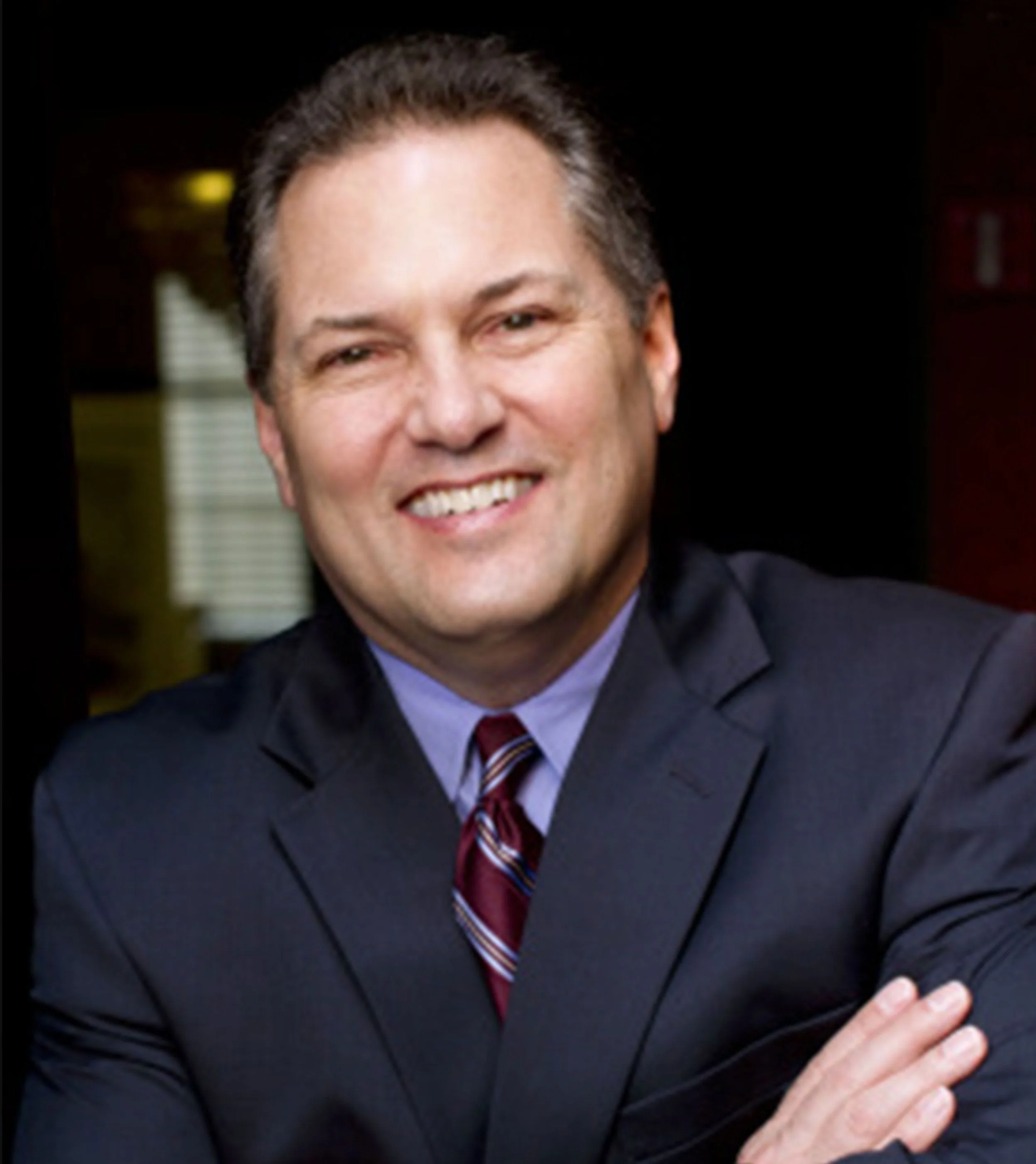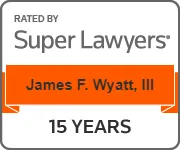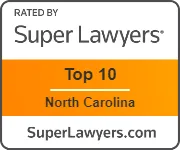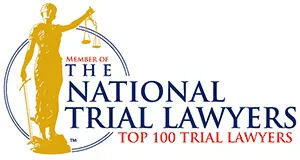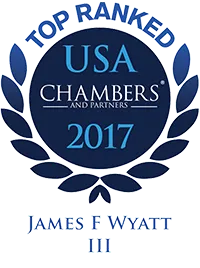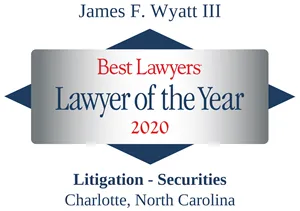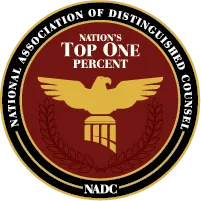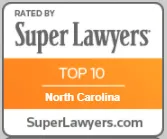About
James F. Wyatt, III is recognized as one of North Carolina’s leading trial lawyers. He is a member of the International Academy of Trial Lawyers, the American College of Trial Lawyers, the Best Lawyers in America, has a Band 1 Ranking with Chambers and Partners, and has been named on numerous occasions as the best white collar defense and civil trial lawyer in both Charlotte and the State of North Carolina.
In 2023, for the fourth straight year, James was selected by Super Lawyers as the Number One Lawyer in North Carolina, regardless of specialty or field. This ranking was obtained based on peer nominations, research by Super Lawyers and a Blue Ribbon review process. In 2021, Super Lawyers published a feature cover story on James (which can be accessed here).
James was also recently featured in an article that focused on the James “Slim” Bouler federal criminal trial involving NBA star Michael Jordan, as mentioned in The Last Dance (ESPN television series). The Charlotte Observer article can be accessed here.
James was recently named to Business North Carolina’s Power List 2021. This magazine lists the most powerful individuals in the state, and focuses mainly on those chosen for leadership positions by their peers. He was inducted into the Power List Hall of Fame in 2023.
James attended Vanderbilt University, graduating in 1978 with a degree in Economics with highest honors. He graduated in 3 ½ years, was the Salutatorian of his graduating class, and was a member of Phi Beta Kappa and many other honorary societies. James obtained his Certified Public Accountant (CPA) certificate after graduating from college. James graduated from Duke Law School in 1982, after being selected by his peers as the Executive Editor of the Duke Law Journal and as the Chairman of the Moot Court Board.
After graduating from Duke Law School, James clerked for United States District Court Judge Harold L. Murphy in the Northern District of Georgia. Judge Murphy was one of Georgia’s leading trial lawyers and legislators before he ascended to the federal bench. James then worked for three years with Bobby Lee Cook, Sr. of Summerville, Georgia. The television show “Matlock” is patterned after Mr. Cook. When working with Mr. Cook, James tried over 30 cases to verdict, ranging from criminal RICO and murder trials to diverse federal and state cases, both civil and criminal. James opened his own law practice in Charlotte in 1986, and has engaged in the trial of criminal and civil cases since then, now specializing in white collar defense, whistleblower cases and class action cases.
In 1991, at the age of 33, James received an “AV” Martindale Hubbell rating and was listed in Martindale Hubbell’s Register of Pre‑Eminent Civil and Criminal Trial Lawyers. The same year, he was selected to speak on the topic of closing arguments at the North Carolina Criminal Defense “All Star” Seminar. In 1992, he was named one of six top young attorneys in Charlotte by the Business Journal. In 1994, he was selected to be a member of the Best Lawyers in America. In 1999, he was selected as one of Charlotte’s Best Lawyers by Charlotte Magazine. In 2004, James was selected by Business North Carolina as the best criminal defense lawyer in North Carolina. James was selected by Best Lawyers as the White Collar Lawyer of the Year (2011); Banking and Finance Lawyer of the Year (2014); Criminal Defense: Non-White Collar Lawyer of the Year (2013-14); and Charlotte Criminal Defense White Collar Lawyer of the Year (2019). In 2020, James was first selected by Super Lawyers as the best lawyer in North Carolina, regardless of specialty or field.
Currently, James is listed in Best Lawyers in America in four separate categories: Bet‑The‑Company Litigation, Commercial Litigation, Non‑White Collar Criminal Defense and White Collar Criminal Defense. He is also a Member of the American College of Trial Lawyers, an organization consisting of outstanding civil and criminal trial lawyers (with fewer than 1% of the lawyers in the United States and Canada becoming members of this organization after a thorough vetting process). He is currently the State Chair of the North Carolina ACTL fellows. Additionally, James was inducted into the International Academy of Trial Lawyers, whose membership is limited to 500 fellows from the United States “who have achieved a career of excellence through demonstrated skill and ability in jury trials.”
In addition to his representation of individuals and businesses in white collar and criminal defense matters, James has represented numerous parties in both class action litigation and qui tam lawsuits over the past 20 years. In qui tam litigation, James has represented physicians, medical billing and coding personnel and other employees of medical practices in qui tam whistleblower lawsuits filed under the federal False Claims Act, the Anti‑Kickback Statute, the federal Physician Self‑Referral Statute (or Stark Law), and the North Carolina False Claims Act. These cases have included issues of false and fraudulent billing, upcoding, improper referrals and illegal kickbacks. He has been co‑counsel for the whistleblowers in two recent settlements of over $100,000,000 each, and a recent class action settlement exceeding $1 billion.
James recently presented a seminar to counsel throughout the State of North Carolina concerning the North Carolina False Claims Act (accessed here). In addition, James recently co-authored two publications concerning the North Carolina False Claims Act, including a comparison of this statute with the federal False Claims Act (accessed here).
Honors & Awards
- American College of Trial Lawyers (ACTL) – Member since 2008; selected for ACTL North Carolina State Committee (2008-present); elected Vice Chair of ACTL North Carolina State Committee (2021-22) and Chair of this Committee (2023-24)
- Named to Business North Carolina’s Power List 2021. This article lists the most powerful individuals in the state, and focuses mainly on those chosen for leadership positions by their peers. Selected to Power List's Hall of Fame in 2022.
- Super Lawyers feature cover story ('Defending the Unpopular') and named the top lawyer in North Carolina regardless of specialty or field (2021)
- Ranked the Number 1 Lawyer in the State of North Carolina, regardless of specialty or field, by Super Lawyers from 2020 to the present (2020, 2021, 2021 and 2023). The ranking was obtained based on peer nominations, research by Super Lawyers and a Blue Ribbon review process.
- Best Lawyers’ Lawyer of the Year – Criminal Defense: White-Collar for Charlotte (2019) (awarded to the lawyer in a region and practice area who receives the highest rating from their peers)
- Ranked in the Top 10 Lawyers in North Carolina by Super Lawyers, regardless of specialty or field (2017 to present)
- International Academy of Trial Lawyers – Member (2017-present)
- One of three lawyers profiled in an article published by Super Lawyers entitled “Defending the Deplorable” (published 2007, updated February 2016)
- Band 1 Ranking with Chambers and Partners: Litigation – White-Collar Crime and Government Investigations (2016-present)
- Best Lawyers: Banking and Finance Lawyer of the Year (2014)
- Best Lawyers Charlotte Criminal Defense: Non-White Collar Lawyer of the Year (2013-2014)
- Best Lawyers Charlotte Criminal Defense: White-Collar Lawyer of the Year (2011)
- Listed by Corporate Counsel as one of the Top Lawyers in Bet the Company Litigation (2008-present)
- Listed by Business North Carolina as North Carolina’s Best Criminal Defense Lawyer in article entitled “Legal Elite - Up On The Law” (2005)
- Listed by Charlotte Magazine as one of North Carolina’s “Superlawyers” (2005-present)
- Listed by Business North Carolina as one of North Carolina’s best lawyers in article entitled “Legal Elite” (2004)
- Listed by Charlotte Magazine as one of Charlotte’s best lawyers in article entitled “These Are The City’s Best Lawyers” (1999)
- Best Lawyers in America (1994-present)
- One of six lawyers profiled in an article published by The Business Journal in Charlotte entitled “The Verdict Is In: Charlotte’s Top Young Attorneys” (May 1992)
- Listed in Martindale-Hubbell’s Bar Register of Preeminent Civil and Criminal Trial Attorneys and received Martindale Hubbell’s “AV” rating (1991-present)
Legal Community/Activities
- Chairman and Board member, La Escuelita Bilingual Preschool (bilingual preschool for Hispanic (and some non-Hispanic) students that prepares preschoolers for cultural, academic and language challenges they will face in kindergarten (2016 to present) (www.laescuelitabp.org)
- Wyatt family founded and operates One By One Costa Rica, a 501(c)(3) charitable foundation that assists the Vuelo de Aguila church in San Jose, Costa Rica in reaching out to at-risk teens (www.onebyonecostarica.com)
- Initial Chairman and Member of Board of Directors of Federal Defenders of Western North Carolina (2004‑2015)
- Chairman and Trustee – McKnight Education Trust Foundation (2006 to present)
- Board of Governors, North Carolina Academy of Trial Lawyers (1997-2000)
- Criminal Law Section of the North Carolina Academy of Trial Lawyers (President 1994-1995, Vice President 1993-1994, Secretary 1992-1993, Chairman/Lawyer’s Assistance Committee 1991-1992)
- Chairman and Member, Federal Bar Advisory Council (1996-2001)
- Member of the Fourth Circuit CJA Appellate Panel Committee, appointed by the Fourth Circuit Court Judges (2007-2012)
- Board of Directors, Davidson Habitat for Humanity (1991-1995)
- Chairman of the Mecklenburg County Bar’s Habitat for Humanity Project (first Habitat House built solely by a bar association in the nation) (1991)
- Speakers Counsel, Charlotte Habitat for Humanity
Other Pro Bono, Legal Aid, Volunteer Services
- March 1995: Testimony given to the United States Sentencing Commission concerning the money laundering laws
- State v. Mahatha: 800 hours of court appointed work in representing capital murder defendant through trial
- United States v. Carbarcas: 500 hours of court appointed work in representing extradited drug kingpin at court’s request
- Represented numerous clients in pro bono matters
- Purchased (in 1993), restored and preserved the Mayes House, a historically designated structure built in 1902. Click here to see an essay written by Dan Morrill about the Mayes House.
Education
- Duke University (J.D., 1982)
- Vanderbilt University (B.S., summa cum laude, 1978)
Admitted
- State Bar of Georgia (1983)
- State Bar of North Carolina (1986)
- Northern District of Georgia (1982)
- 11th Circuit Court of Appeals (1982)
- Western District of North Carolina (1986)
- 4th Circuit Court of Appeals (1986)
- Eastern District of North Carolina (1990)
- Middle District of North Carolina (1991)
- U.S. Supreme Court (2000)
Published Articles & Seminars
Published Articles
- J. Wester and J. Wyatt, “We Don’t Want Our Judges to be Politicians,” The Charlotte Observer, (December 2017)
- M. Raspanti, P. Brecht and J. Wyatt, “The Tar Heel State Steps Up Its Fight Against Fraud”, The Legal Intelligencer (June 26, 2012)
- J. Wyatt, “What to do When the Police Come Knocking,” The Business Journal, at 5, 13 (April 2003)
- J. Wyatt, “Voir Dire in Criminal and Capital Cases,” Trial Briefs, at 24-31 (August 2002)
- J. Wyatt, “Money Laundering Laws Use Is Too Wide,” The Business Journal, Vol. 14, No. 32 (November 12, 1999)
- J. Wyatt, and T. Coffey, “Criminal Justice: Looking to the Next Century,” North Carolina State Bar Journal, Vol. 3, No. 1 (Spring 1998)
- J. Wyatt, “Health Care Fraud,” Trial Briefs, at 10-12 (Spring 1997)
- J. Wyatt, J. Cunningham and E. Rawls, “A Double Jeopardy Defense to an Impaired Driving Prosecution,” Trial Briefs, at 28-30 (Spring 1995)
- J. Wyatt, “Aggravating and Mitigating Circumstances Under North Carolina’s Structured Sentencing Statutes,” Trial Briefs, at 4-7 (Winter 1994-1995)
- J. Wyatt, “The Federal Forfeiture Laws: Effective Law Enforcement Tool Or License For White Collar Car Jacking?,” Trial Briefs, Vol. 26, No. 1 at 20-26 (Spring 1994)
- J. Wyatt, “The Role of Fed. R. Crim. Pro. 41(e) And Anomalous Jurisdiction in Civil Forfeiture Actions,” Trial Brief, Vol. 25, No. 4 at 31-35 (Winter 1993-1994)
- B. Cook and J. Wyatt, “Preserving The Record For Appeal,” Trial, Vol. 29, No. 3 at 58-62 (March 1993)
- B. Cook and J. Wyatt, “Filing A Civil Rights Action As Part Of An Aggressive Criminal Defense,” The Champion, Vol. XVI, No. 6 at 14-18 (July 1992)
Seminar Presentations
- September 30, 2021 – “The False Claims Act Today: Practice in the Western District of North Carolina,” Federal Bar Association Qui Tam Section National Webinar. Presenter concerning relator representation.
- December 16, 2016 – “Litigation of Privilege Issues,” ABA White Collar CLE
- July 21, 2016 – “Government Investigations of Health Care Entities,” North Carolina Society of Health Care Attorneys, the Federal Bar Association’s Health Law Section, the Federal Bar Association’s Eastern and Western North Carolina Chapters, and Parker Poe/2016 Health Care Symposium
- May 13, 2016 – “The Evolving Trends of White Collar Criminal Law in North Carolina,” North Carolina Bar Association Foundation/2016 White Collar Crime Program
- September 25, 2015 – “Qui Tam Litigation: A Practitioner's Symposium,” ABA Criminal Justice Section/White Collar Crime Southeast Region Subcommittee
- March 21, 2015 – “Qui Tam Litigation: What Makes It Different?”, NC Fellows of the American College of Trial Lawyers 2015 Annual Meeting
- January 31, 2014 – “The Art of Advocacy - Openings & Closings in a White Collar Crime Case,” Institute of Continuing Legal Education Georgia
- June 13, 2013 – “Motions Practice and Parallel Proceedings,” ABA Securities Fraud Conference
- November 27, 2012 – “Federal and North Carolina False Claims Act,” (Webcast) North Carolina Bar Association
- April 23, 2010 – “White Collar Law Update,” American College of Trial Lawyers Annual State Meeting
- April 9, 2010 – “High Level White Collar Investigations,” North Carolina Bar Association
- May 15, 2008 – “Parallel Civil and Criminal Proceedings,” North Carolina Bar Association
- April 11, 2008 – “Jury Selection 2008,” North Carolina Academy of Trial Lawyers
- February 22, 2008 – “Criminal Consequences of Civil Actions,” Mecklenburg County Bar Association
- January 26, 2007 – “Jury Selection,” All Star Trial Advocacy 2007
- April 2005 – “Expert Witnesses,” Criminal Practice 2005, Wake Forest University School of Law
- December 19, 2003 – “Prosecution and Defense of White Collar Crime in 2003: Are We On The Right Track?” Criminal Law Update 2003, Fourth Circuit Seminars
- October 10, 2003 – “Preparation of a Business Crime Case,” North Carolina Bar Association
- January 9, 2003 – “Evidentiary Issues in Criminal Cases,” Practical Evidence 2003, Wake Forest University School of Law
- December 2002 – “Addressing Health Care Fraud and Abuse in North Carolina,” National Business Institute
- July 9, 2002 – “Criminal Health Care Fraud Investigations,” Medicaid, Medicare and Medical Assistance in North Carolina, Lorman Education Services
- January 10-11, 2002 – “Litigating Motions to Suppress,” Criminal Practice 2002, Wake Forest University School of Law
- October 5, 2001 – “Persuading the Jury That Your Client is Retarded Without A Psychiatric Expert,” North Carolina Academy of Trial Lawyers
- December 6, 2000 – “Federal Sentencing Guidelines,” Advanced Criminal Law Seminar, Duke School of Law
- November 17-18, 2000 – “Search & Seizure Checklist,” North Carolina Bar Association
- October 18, 2000 – “Criminal Health Care Fraud Investigations,” North Carolina Bar Association
- April 14, 2000 – “Criminal Health Care Fraud Investigations,” North Carolina Bar Association
- November 17, 1999 – “Emerging Trends in White Collar Prosecutions,” North Carolina Academy of Trial Lawyers
- June 14, 1999 – “Recent Developments in Federal Law,” North Carolina Academy of Trial Lawyers Convention
- January 15, 1999 – “Substantive White Collar Law,” Fourth Circuit Seminars
- December 17, 1998 – “The Scottsboro Boys – Lessons in Lawyering,” Forsyth County Bar Awards Banquet
- December 12, 1998 – “Criminal Law Update,” Fourth Circuit Seminars
- June 12, 1998 – “Recent Developments in Federal Law,” North Carolina Academy of Trial Lawyers Convention
- March 1998 – “Money Laundering Laws,” Advanced Criminal Law Seminar, Duke School of Law
- March 14, 1998 – “Health Care Fraud,” North Carolina Academy of Trial Lawyers
- December 19, 1997 – “Criminal Law Update,” Fourth Circuit Seminars
- September 17, 1997 – “White Collar Crime,” Criminal Law Roundtable: North Carolina Academy of Trial Lawyers Seminar
- June 17, 1997 – “Federal/Supreme Court Update,” North Carolina Academy of Trial Lawyers Convention
- January 24, 1997 – “Pre-Indictment Tactics, Plea-Bargaining & Sentencing in State & Federal Court,” North Carolina Academy of Trial Lawyers
- October 18, 1996 – “Cross-Examination of Financial Experts in Criminal Cases,” North Carolina Academy of Trial Lawyers
- October 18, 1996 – “The Money Laundering Statutes,” UNC-Chapel Hill School of Law
- October 3, 1996 – “North Carolina’s Controlled Substance Abuse Tax Laws,” North Carolina Academy of Public Defenders
- July 22, 1996 – “Money Laundering and Fraud Laws,” Annual Meeting of Certified Public Accountants
- March 29, 1996 – “Getting to Not Guilty in a Drug Trial,” North Carolina Academy of Trial Lawyers
- September 29, 1995 – “Closing Arguments: Securing Your Win,” North Carolina Bar Association
- June 13, 1995 – “Federal Practice – New Developments,” North Carolina Academy of Trial Lawyers Convention
- March 24, 1995 – “What You Need To Know For Your Criminal Practice & Where To Get This Knowledge,” North Carolina Academy of Trial Lawyers
- February 15, 1995 – “Money Laundering Amendments,” U.S. Sentencing Commission
- September 17, 1994 – “Understanding Key Concepts In Structured Sentencing, Prior Record Levels & Aggravating and Mitigating Circumstances,” North Carolina Academy of Trial Lawyers
- March 18, 1994 – “Criminal Law: Skewering the Snitch, Demonstration of Cross-Examination of a Snitch,” North Carolina Academy of Trial Lawyers
- February 18, 1994 – “The Federal Forfeiture Laws: Are They An Effective Law Enforcement Tool or a License for White Collar Car-Jacking,” Mecklenburg County Bar Association
- January 7, 1994 – “Evaluating Relevant Aggravating and Mitigating Circumstances,” North Carolina Academy of Trial Lawyers
- December 10, 1993 – “Uncivil Litigation; Deposition Misbehavior,” Western District of North Carolina
- February 5, 1993 – “Federal Business Crime For The Civil & Criminal Practitioner: 18 U.S.C. §§ 1956, 1957 (1986) The Money Laundering Statutes,” North Carolina Bar Association
- September 25, 1992 – “The Role of Fed. R. Crim. Pro. 41(e) and Anomalous Jurisdiction in Civil Forfeiture Actions,” UNC-Chapel Hill School of Law
- March 27, 1992 – “Ethics of Fees,” North Carolina Academy of Trial Lawyers
- December 6, 1991 – “The Effective Use of Closing Arguments in Criminal Cases,” North Carolina State Bar “All Star” Seminar
- October 11, 1991 – “18 U.S.C. §§ 1956, 1957 (1986), The Money Laundering Statutes,” North Carolina State Bar Association
- 1990 to 2000 – Duke, UNC-Chapel Hill and Wake Forest Schools of Law: Presentations to Advanced Criminal Law and Trial Practice Classes
- April 21, 1989 – “Selected Issues in Motions Practice in Narcotics Cases in State and Federal Court,” Mecklenburg County Bar Association
- 1988 – “North Carolina Pre-Trial Motion Practice in Criminal Cases,” North Carolina Academy of Trial Lawyers

